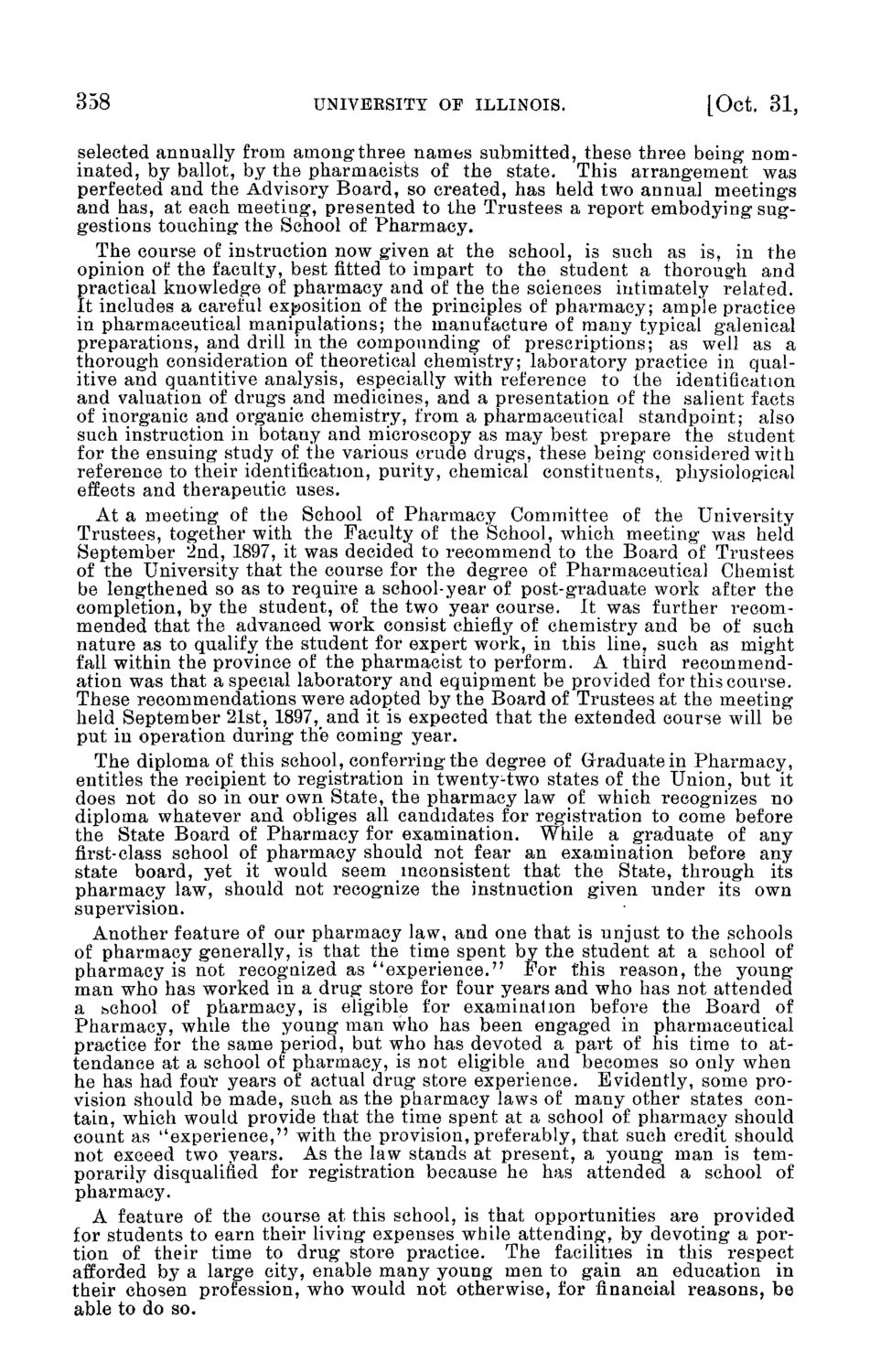| |
| |
Caption: Board of Trustees Minutes - 1898
This is a reduced-resolution page image for fast online browsing.

EXTRACTED TEXT FROM PAGE:
358 UNIVERSITY OF ILLINOIS. [Oct. 31, selected annually from among three names submitted, these three being nominated, by ballot, by the pharmacists of the state. This arrangement was perfected and the Advisory Board, so created, has held two annual meetings and has, at each meeting, presented to the Trustees a report embodying suggestions touching the School of Pharmacy. The course of instruction now given at the school, is such as is, in the opinion of the faculty, best fitted to impart to the student a thorough and practical knowledge of pharmacy and of the the sciences intimately related. It includes a careful exposition of the principles of pharmacy; ample practice in pharmaceutical manipulations; the manufacture of many typical galenical preparations, and drill in the compounding of prescriptions; as well as a thorough consideration of theoretical chemistry; laboratory practice in qualitive and quantitive analysis, especially with reference to the identification and valuation of drugs and medicines, and a presentation of the salient facts of inorganic and organic chemistry, from a pharmaceutical standpoint; also such instruction in botany and microscopy as may best prepare the student for the ensuing study of the various crude drugs, these being considered with reference to their identification, purity, chemical constituents, physiological effects and therapeutic uses. At a meeting of the School of Pharmacy Committee of the University Trustees, together with the Faculty of the School, which meeting was held September 2nd, 1897, it was decided to recommend to the Board of Trustees of the University that the course for the degree of Pharmaceutical Chemist be lengthened so as to require a school-year of post-graduate work after the completion, by the student, of the two year course. It was further recommended that the advanced work consist chiefly of chemistry and be of such nature as to qualify the student for expert work, in this line, such as might fall within the province of the pharmacist to perform. A third recommendation was that a special laboratory and equipment be provided for this course. These recommendations were adopted by the Board of Trustees at the meeting held September 21st, 1897, and it is expected that the extended course will be put in operation during the coming year. The diploma of this school, conferring the degree of Graduate in Pharmacy, entitles the recipient to registration in twenty-two states of the Union, but it does not do so in our own State, the pharmacy law of which recognizes no diploma whatever and obliges all candidates for registration to come before the State Board of Pharmacy for examination. While a graduate of any first-class school of pharmacy should not fear an examination before any state board, yet it would seem inconsistent that the State, through its pharmacy law, should not recognize the instnuction given under its own supervision. Another feature of our pharmacy law, and one that is unjust to the schools of pharmacy generally, is that the time spent by the student at a school of pharmacy is not recognized as "experience." For this reason, the young man who has worked in a drug store for four years and who has not attended a school of pharmacy, is eligible for examination before the Board of Pharmacy, while the young man who has been engaged in pharmaceutical practice for the same period, but who has devoted a part of his time to attendance at a school of pharmacy, is not eligible and becomes so only when he has had fou"r years of actual drug store experience. Evidently, some provision should be made, such as the pharmacy laws of many other states contain, which would provide that the time spent at a school of pharmacy should count as ''experience," with the provision, preferably, that such credit should not exceed two years. As the law stands at present, a young man is temporarily disqualified for registration because he has attended a school of pharmacy. A feature of the course at this school, is that opportunities are provided for students to earn their living expenses while attending, by devoting a portion of their time to drug store practice. The facilities in this respect afforded by a large city, enable many young men to gain an education in their chosen profession, who would not otherwise, for financial reasons, be able to do so.
| |